LIBIA CASTRO AND OLAFUR OLAFSSON | ICELAND PAVILION AT THE 54TH VENICE BIENNALE 2011
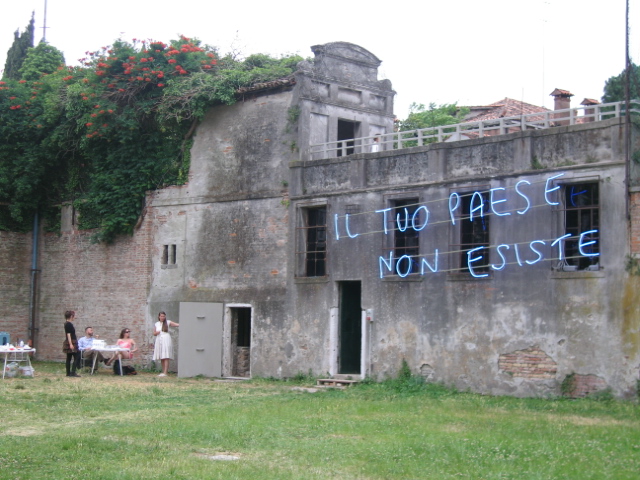
CIA.IS – Venice Biennale – Icelandic Pavilion
press release “Under Deconstruction”
The Pavilion of Iceland is located within the Palazzo Zenobio, a late 17th century structure in the Dorsoduro section of Venice. Today, the Palazzo Zenobio is home to the Collegio Armeno Moorat-Raphael. The palace’s broad façade and two wings that extend backwards make it an intriguing architectural example in Venice. Among its other notable features are trompe l’oeil frescoed ceilings and a formal garden. The Pavilion of Iceland is located off the garden, in the building’s former laundry house.

Reykjavík, Iceland, 17 March 2011:
The official Icelandic representation at the 54th International Art Exhibition — La Biennale di Venezia will be the Spanish-Icelandic duo of Libia Castro and Ólafur Ólafsson, whose collaborations explore the political, socio-economic, and personal forces that affect life in the present day. Their work, which has taken them to cities around the world, and often develops out of their personal interactions with people and places, can be characterized as an artistic interpretation of culture and the complex relationships that compose it. Castro and Ólafsson’s exhibition for Venice, Under Deconstruction, will explore current socio-political issues in Iceland and elsewhere, using video, performance, sculpture, sound, and music interventions. The 2011 exhibition is organized by the Icelandic Art Center in Reykjavík, Iceland, under the commissionership of Dorothée Kirch, and is curated by Ellen Blumenstein.
Within the Pavilion of Iceland, located at the Palazzo Zenobio at the Collegio Armeno Moorat-Raphael in Dorsoduro, Castro and Ólafsson will present a musically-inflected video installation, Constitution of The Republic of Iceland (2008-2011). In conjunction with this work, the artists will also present a Venice-based iteration of their ongoing project, Your Country Doesn’t Exist (2003-present), which will consist of a video registration of a performance in Venice, on view in the Pavilion, and a sound intervention broadcast regularly via public loudspeakers at a public space in the city.
For Constitution of The Republic of Iceland, Castro and Ólafsson worked together with Icelandic composer Karólína Eiríksdóttir to create a score to which the Icelandic Constitution could be performed with soprano, baritone, piano, double bass, and a mixed chamber choir. The composition was first publicly performed in March 2008 in Iceland, six months before the collapse of the country’s banking system. The video to be presented in Venice is of a recent performance of the work staged and broadcast on Icelandic TV and at Hafnarborg Cultural Centre in Hafnarborg, Iceland, in February of this year.
Libia Castro (b. Madrid, Spain) and Ólafur Ólafsson (b. Reykjavik, Iceland), aptly referred to as “citizens of the world”, met in the Netherlands in 1997 and have been collaborating since. Exploring the relationships between art, everyday life, sociopolitical and crosscultural issues, Castro and Ólafsson have built up a body of work using a variety of media, which includes documentary video, sound and multimedia installation, public performance, sculpture, and photography. They have developed a conceptual approach to art making that is characterized by a sense of play, transgression, and inventiveness.
Both artists received their M.A. in visual arts from The Frank Mohr Institute in the Netherlands, where their partnership was formed. From the onset, their work has garnered critical attention in the Netherlands, Germany, Iceland, and abroad. They have shown in international exhibitions at major museums, contemporary art centers and galleries around the world, and, in 2009, they were awarded third place in the prestigious Dutch art prize, Prix de Rome, for their video Lobbyists. Their work is included in such collections as CA AC in Sevilla, Spain, The National Gallery of Iceland, and The Kverneland Folgerø Sammlung in Berlin, Germany.
..)(..
Your Country Doesn’t Exist è una campagna tuttora in corso, iniziata nel 2003, per la quale gli artisti hanno viaggiato nel mondo diffondendo il messaggio, Il Tuo Paese Non Esiste in diverse lingue e tramite vari mezzi visivi tra i quali cartellonistica, pubblicità televisiva e disegni murali.
A Venezia, Castro e Ólafsson presentano il progetto in quattro iterazioni.
Prima della Biennale, gli artisti hanno messo in scena e registrato una performance pubblica interpretata da un mezzo-soprano, Ásgerður Júníusdóttir, che attraversava i canali di Venezia in gondola cantando la frase: “Questo è un annuncio di Libia e Ólafur: il tuo paese non esiste”.
L’artista cantava la frase in diverse lingue ed era accompagnata da tromba (David Boato) e chitarra (Alberto Mesirca). Le liriche erano state composte dagli artisti e comprendevano frasi tratte da un testo della scrittrice e curatrice Antonia Majaca sul progetto Your Country Doesn’t Exist. La partitura era opera della compositrice islandese Karólína Eiríksdóttir. Per tutta la durata della Biennale una video installazione della performance sarà in mostra nel Padiglione dell’Islanda. Il 2 giugno sarà anche messa in scena una performance nei canali della città. La gondola seguirà un percorso attraverso i padiglioni nazionali dei Giardini di Castello e l’Arsenale. Inoltre, una scultura neon recante la scritta “Il tuo paese non esiste” (“Your country doesn’t exist”) sarà installata sulla facciata del padiglione. La parte finale della serie è rappresentata da un dipinto “Fai da te” dell’Ambasciatore dell’Islanda Gunnar Snorri Gunnarsson, eseguito nel febbraio 2011 sotto la
direzione degli artisti, e ora esposto nel padiglione Constitution of the Republic of Iceland rappresenta la prima collaborazione di Castro e Ólafsson con la compositrice islandese Karólína Eiríksdóttir. Gli artisti e la compositrice hanno lavorato per creare una partitura sulla quale la Costituzione Islandese potesse essere declamata da voci di soprano e baritono, accompagnate da pianoforte, doppio basso e un coro misto da camera. La composizione è stata eseguita per la prima volta in pubblico in Islanda, nel marzo 2008, sei mesi prima del crollo del sistema bancario del paese. Il video presentato a Venezia è una versione recente del lavoro, messo in scena alla Icelandic National Broadcasting Service Television, e trasmessa dalla TV nazionale islandese nel febbraio 2011. Il video è stato presentato varie volte, la prima delle quali il giorno in cui la neo eletta Assemblea Costituzionale si riunì per intraprendere la revisione della Costituzione islandese.
Exorcising Ancient Ghosts è un opera audio in due lingue basata sulla ricerca di Castro e Ólafsson sul tema dei diritti delle donne e degli stranieri nella società della Grecia antica, prodotto a Napoli nel 2010. Il lavoro trae ispirazione dalla scoperta, ad opera degli artisti, di una legge ateniese della metà del sec. V a. C. che proibiva agli ateniesi di sposare o avere relazioni intime con stranieri.
Castro e Ólafsson hanno lavorato con un gruppo di ricercatori per creare un drammatico “collage di testo”, composto di vari estratti di antichi testi greci di politica, filosofia, diritto e letteratura.
Gli artisti hanno quindi messo in scena due letture dei testi, pronunciate da due coppie durante un rapporto sessuale: una formata da una donna napoletana e un uomo balinese che leggevano il testo in italiano, l’altra coppia, della Nuova Zelanda, leggeva il testo in inglese. Per Venezia, gli artisti presentano il lavoro come un’installazione sonora sul tetto del padiglione, incorporando così l’architettura stessa del padiglione nel lavoro. Le registrazioni sonore sono trasmesse simultaneamente da un vaso di terracotta attraverso due set di auricolari.


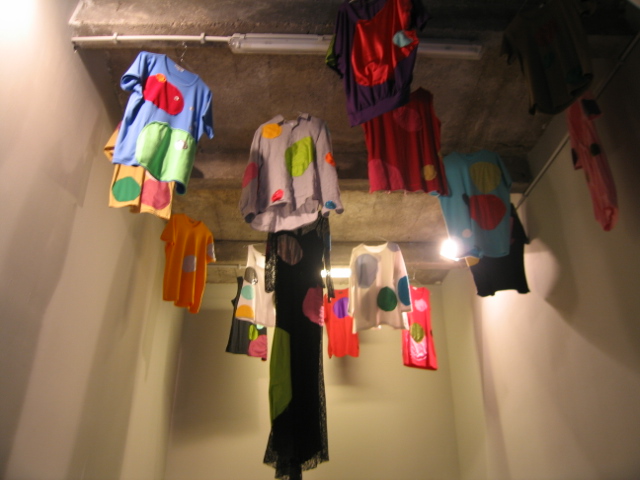
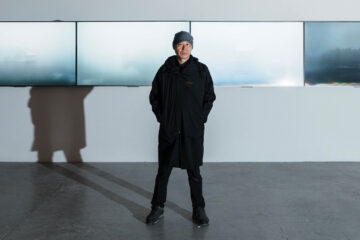
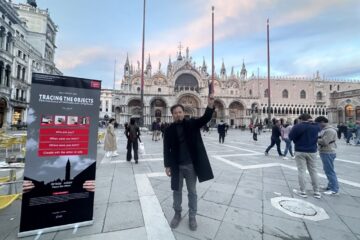
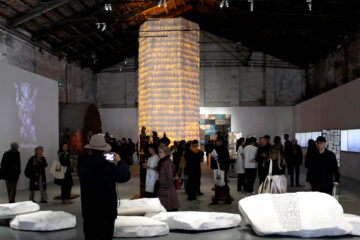


No Comment